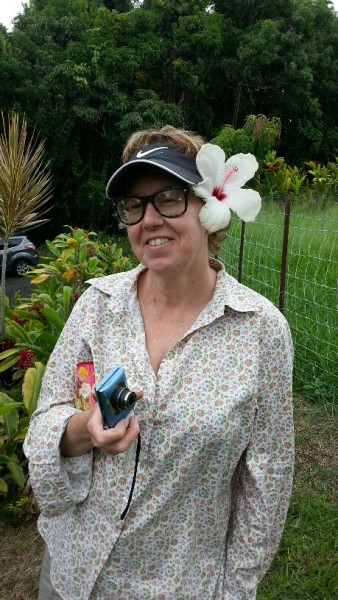Long-time Interior farmer founds new farm in paradise
March 25, 2015

By Nancy Tarnai
907-474-5042
3-23-2015
A long-time fixture at the Tanana Valley Farmers Market will no longer be selling perennials. While Tracy Pulido will miss the friends she made at the market, she is deliriously happy at her new farm in Hawaii.
Pulido, who lived in Interior Alaska since 1983 and had been operating Chena Lakes Farm, pulled out all stops last fall and relocated to Ninole, about 20 miles north of Hilo, taking her three donkeys along.
“We are all liking it here very much,” Pulido said.
Just getting the donkeys to Hawaii proved quite the ordeal. Prior to the trip, Pulido had the animals practice getting in a trailer, then they rode to California. Due to a rash on her legs from gnat bites, one of the donkeys almost wasn’t allowed on the ship, causing Pulido much anguish.
During the week-long journey, the salt air cleared up the rash. The woman scheduled to pick up the animals in Honolulu canceled, but someone else agreed to get them on a boat to the Big Island. The farrier who met them told Pulido all three of them leapt into the trailer they were so happy to be off the boat.
“They have a little barn but refuse to go in it except to eat their treat because they think someone may lock them in and put them on a boat again,” Pulido said. “When it rains they go and stand under the mango trees.”
One huge advantage of Hawaii over Alaska is Pulido doesn’t have to buy hay to feed; the donkeys eat the grass on her 3.4 acres of land. “I’m not biting my nails if I’m going to be able to get enough hay. They munch on the grass and it’s perfect for donkeys. They do well on it.”
The one drawback is Pulido misses her husband Robert, who stayed in North Pole until the farm and lodge are sold.
“I was tired of the smog in Fairbanks,” Pulido said of her decision to relocate. While vacationing in Hawaii she realized how much she liked it and started looking for property. “I convinced my husband to invest,” she said. They bought a little 1920s plantation home, “a real fixer upper,” she said. “It has a nice fenced pasture and the donkeys have a million-dollar view of the ocean.”
“There is excellent potential here,” Pulido said. “I have 18 inches of Hilo loam and we are on a plateau with good drainage.” The property has bananas, oranges, lemons, mulberries and 70-foot mango trees.
“It’s very green all the time,” she said. “I don’t have to water and the temperatures are perfect all time. It’s 80 in the day and 65 to 70 at night.”
After learning the fauna of her new locale, she plans to specialize in flowering shrubs and sell them at the farmers market, just as she did in Fairbanks. “I have to re-learn all my plants,” she said.
She purchased an encyclopedia of tropical plants and is starting to recognize some of them, noting there are lots of orange and red plants. “In Fairbanks, there are three kinds of trees, and here there are hundreds,” she said.
Another difference is Pulido will need to fertilize in Hawaii. “I’ll need to compost more,” she said. The frequent heavy rain washes nutrients away, but she is pleased as punch with her soil. “It’s a clay-like rich loam the color of poop. I’m on the side of the island with good soil because a volcano hasn’t erupted in 7,000 years. It’s old soil.”
She is mulling over a name for her new farm and is considering “Lohi Lalo,” which means slow down.
“I like changing careers every 10 years,” she said. “I’m happy and I’m committed to staying.”
This column is provided as a service by the UAF School of Natural Resources and Extension and the Agricultural and Forestry Experiment Station. Nancy Tarnai is the school and station’s public information officer. She can be reached at ntarnai@alaska.edu.


